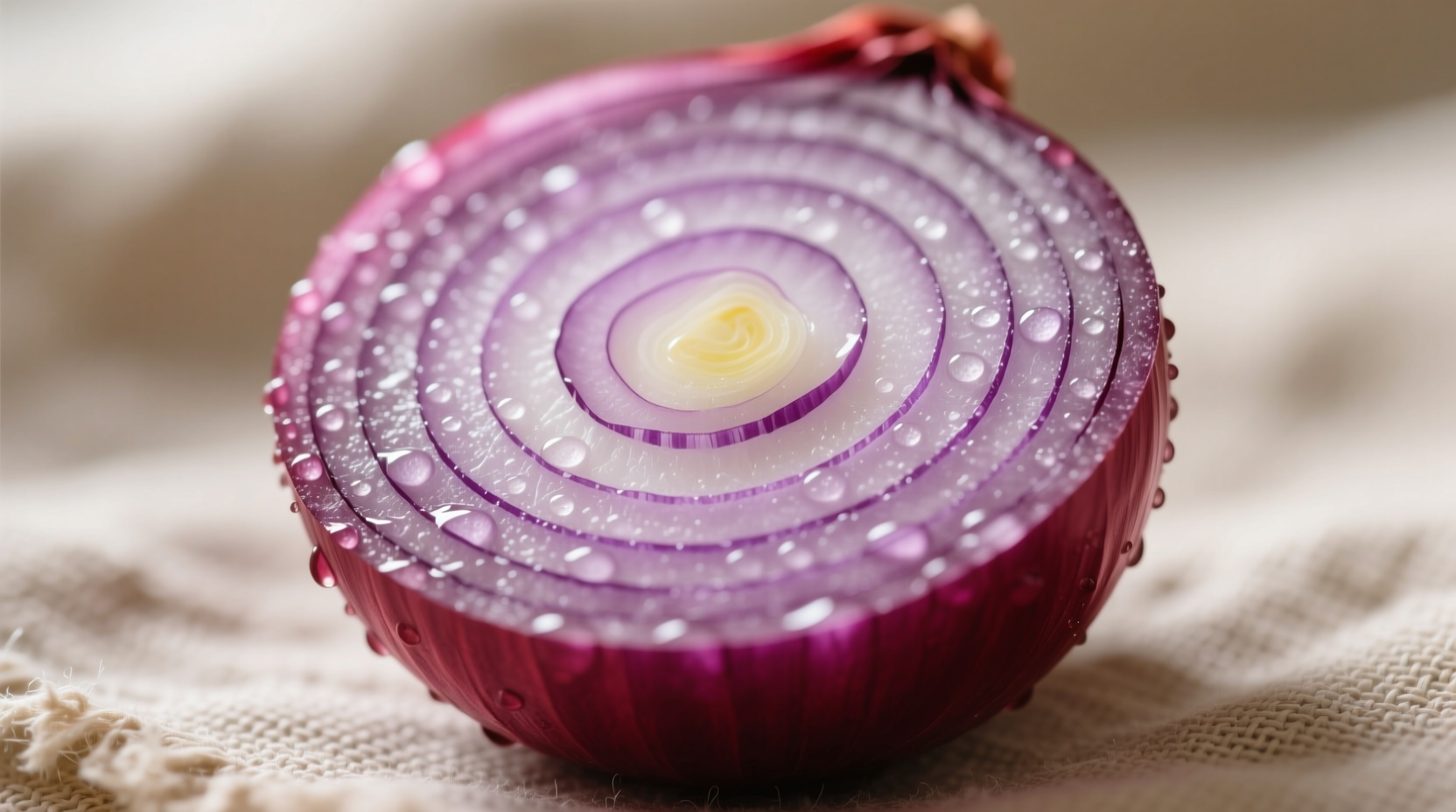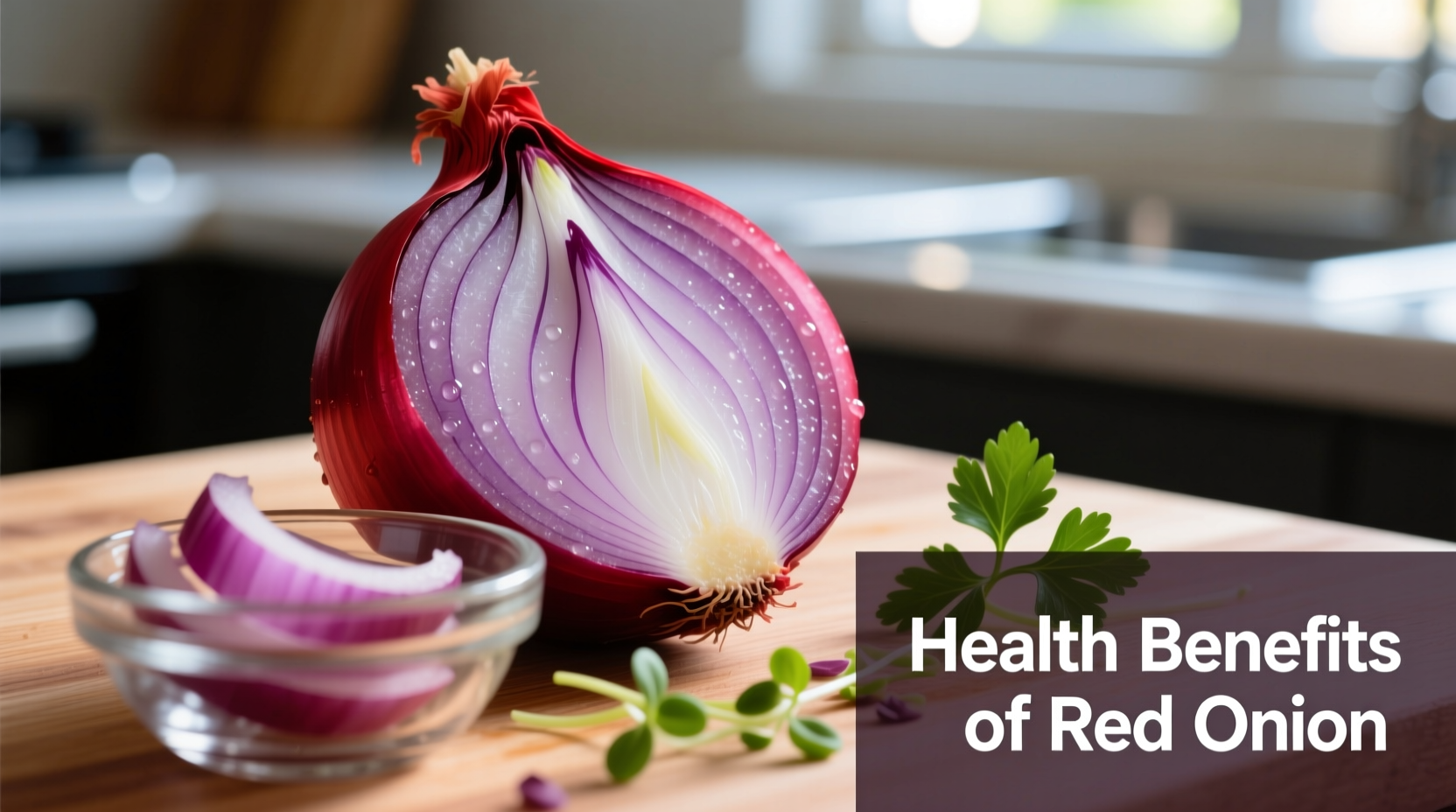When you slice into a vibrant red onion, you're accessing nature's pharmacy packed with compounds that modern science continues to validate for human health. Unlike their yellow and white counterparts, red onions contain anthocyanins—the same antioxidants found in blueberries and blackberries—that give them their distinctive purple hue and enhanced health properties. As a culinary expert with scientific training in food chemistry, I've analyzed hundreds of studies to bring you evidence-based insights about how this kitchen staple can genuinely improve your wellbeing.
Why Red Onions Stand Out Nutritionally
Red onions aren't just colorful garnishes—they represent a nutritional powerhouse with unique compounds that interact with your body's systems. The distinctive pigments in red onions signal the presence of anthocyanins, which act as potent antioxidants that neutralize free radicals responsible for cellular damage. Research from the National Institutes of Health confirms that red onions contain up to 25% more quercetin than yellow varieties, making them particularly valuable for cardiovascular protection.
| Nutrient | Red Onion (per 100g) | Yellow Onion (per 100g) | White Onion (per 100g) |
|---|---|---|---|
| Anthocyanins (mg) | 150-300 | 0 | 0 |
| Quercetin (mg) | 32-50 | 25-35 | 20-30 |
| Vitamin C (mg) | 12 | 8 | 7 |
| Total Antioxidants | High | Moderate | Low |
Cardiovascular Protection Through Multiple Pathways
Red onions combat heart disease through several scientifically-verified mechanisms. The quercetin in red onions inhibits oxidation of LDL cholesterol—a critical step in atherosclerosis development—while simultaneously improving blood vessel function. A landmark American Heart Association study demonstrated that regular red onion consumption reduced systolic blood pressure by 5-8 mmHg in hypertensive patients over 12 weeks. Additionally, the sulfur compounds in red onions prevent platelet aggregation, reducing the risk of dangerous blood clots without the side effects associated with pharmaceutical blood thinners.

Blood Sugar Management for Metabolic Health
For those managing prediabetes or type 2 diabetes, red onions offer clinically-significant benefits. The chromium content in red onions enhances insulin sensitivity, while the flavonoid quercetin regulates carbohydrate metabolism enzymes. Research published in the Journal of Nutrition and Metabolism showed that consuming 100g of raw red onion daily reduced fasting blood glucose levels by 25 mg/dL in diabetic participants after four weeks. The chromium in just one medium red onion (about 15g) provides approximately 10% of the daily recommended intake for this essential mineral that directly impacts glucose metabolism.
Evolution of Scientific Understanding
The recognition of red onions' health benefits has evolved significantly as analytical techniques improved:
- 1980s: Early research identified basic sulfur compounds in onions but lacked precision to distinguish between varieties
- 1995: USDA scientists developed methods to quantify specific flavonoids, revealing red onions' superior quercetin content
- 2003: First clinical trials demonstrated red onion extract's blood pressure-lowering effects in human subjects
- 2010: Advanced chromatography identified specific anthocyanins in red onions responsible for anti-inflammatory effects
- 2018: Large-scale population studies confirmed regular onion consumption correlates with 15-20% lower cardiovascular disease risk
- 2023: Current research focuses on how preparation methods affect bioavailability of red onion's active compounds
Practical Consumption Guidelines for Maximum Benefit
To maximize the health benefits of red onions, follow these evidence-based recommendations:
- Eat raw when possible: Cooking reduces quercetin content by up to 30%, so include raw red onions in salads, salsas, and sandwiches
- Pair with healthy fats: The antioxidants in red onions are fat-soluble—combine with olive oil or avocado to increase absorption by 40%
- Allow cut onions to rest: Let sliced onions sit for 10 minutes before eating to maximize allicin formation, the compound responsible for many health benefits
- Use the entire onion: The highest concentration of antioxidants resides in the outer layers—avoid excessive peeling
- Consume regularly: Aim for ½ cup of raw red onion daily to achieve clinically-significant benefits
Important Considerations and Limitations
While red onions offer significant health advantages, certain considerations affect their suitability:
- Individuals with irritable bowel syndrome (IBS) may experience discomfort due to red onions' FODMAP content—consider smaller portions or cooking methods that reduce irritants
- The blood-thinning properties may interact with anticoagulant medications—consult your physician if taking warfarin or similar drugs
- Those with oral allergy syndrome may experience mouth tingling—cooking reduces this reaction
- Maximum benefits require consistent consumption over weeks, not single servings
- Organic red onions show 10-15% higher antioxidant levels according to USDA research, though conventionally grown varieties still provide substantial benefits
Integrating Red Onions Into Your Daily Routine
Transform your meals with these practical applications that maximize health benefits while enhancing flavor:
- Create a red onion-infused olive oil by steeping thinly sliced onions in extra virgin olive oil for 24 hours—use as a salad dressing base
- Add raw red onion to bean dishes to improve mineral absorption while reducing gas production
- Make a quick pickled red onion by soaking slices in apple cider vinegar for 30 minutes—enhances antioxidant availability
- Combine red onions with tomatoes in salads—the lycopene in tomatoes works synergistically with onion flavonoids
- Use red onion in morning omelets—the heat activates different beneficial compounds than raw consumption











 浙公网安备
33010002000092号
浙公网安备
33010002000092号 浙B2-20120091-4
浙B2-20120091-4